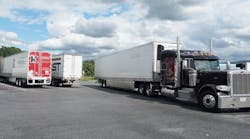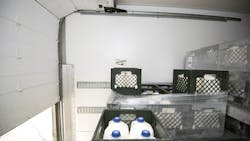Holiday weekends can be a prime time for cargo theft — with more truck shipments left unattended for longer amounts of time — and incidents of theft can spike 50%, according to data from cargo theft prevention technology company Sensitech. Couple that with the end-of-year holiday season's increased e-commerce and retail goods movement, and right now is a good time to be extra mindful as a driver or trucking operation. Here's a look at cargo theft and some tips to help protect your shipments.
The FBI estimates that cargo theft costs U.S. businesses up to $30 billion each year. But the agency has also been compiling more precise data on cargo theft under its Uniform Crime Reporting Program. With info from about 20 states, the FBI found that just less than a third — 31.4% — of stolen cargo overall was recovered in 2016.
Consumable goods, meaning food and beverage items, made up the largest share of overall stolen cargo value. Household goods were next, followed by portable electronics and building materials, which both made up about the same percentage of losses.
Of those items, portable electronics were most likely to disappear without a trace: only 1.4% of those stolen goods were recovered, by reported value. Stolen household and consumable goods were recovered in the high-single-digit percentages, while building materials stood a better chance. Some 35% of those reported stolen goods were recovered by value.
Most often, according to FBI data, cargo theft took place in parking lots and garages. Those accounted for nearly 43% of incidents, with other high-theft locations including roadways and alleys; commercial office buildings; and freight docks and terminals. Also, cargo theft prevention and recovery company CargoNet has reported that among its clients, cargo theft incidents happened most often on Fridays and Saturdays, with those two days accounting for 36% of reported incidents in 2016.
Samsara, a company that makes sensors and other technology to track and monitor trucks, trailers and other expensive assets, suggested some steps that fleets and trucking companies can take to help protect and prepare themselves when it comes to cargo theft.
1. Assess your cargo risk situation.
Check out what your situation is realistically. Know when your trailers are loaded but aren't moving — thieves could be targeting them then.
Also watch for opportune times for cargo theft such as during severe weather. When there's a big storm and the power's out, security personnel (if you have them) won't be expecting or best prepared to handle a heist.
Statistically, thieves are targeting places like parking lots and trucking yards the most for cargo theft, but be aware of the vulnerability of various locations and how long loaded trailers sit around before a shipment is delivered. Urban areas, especially large ones, carry higher risk for organized cargo theft incidents, Samsara noted.
2. Prepare your operations and check/ develop internal security protocols.
Drivers, warehouse personnel, and anyone with access to shipping information especially should be screened appropriately including background checks during the hiring process.
Out on the road, drivers should watch for vehicles tailing them or other suspicious behaviors. Samsara noted that an individual or individuals claiming a truck has hit them has been used in cargo theft schemes. If unsure about such a collision or accident, try to drive to a nearby police station or busy location before stopping.
You can do a lot to minimize risk to your cargo by coordinating better between shipping and receiving departments. And that leads us to...
3. Consider incorporating technology into your operations to help.
Technology can go a long ways in preventing cargo theft, Samsara pointed out. For example, as noted above, synching up shipping and receiving departments regarding a delivery's arrival can mean less dead time sitting around with a trailer full of expensive cargo.
Cargo tech solutions like Samara's can allow ETA tracking of the shipment down to the minute to keep the receiver informed where the truck is. Or geofence alerts can use location points to send notifications when a shipment is nearing the loading dock.
Of course, trailer and other asset-tracking systems can provide GPS location and even live camera views to aid law enforcement in the event of a theft. Door and cargo sensors can deliver data such as whether trailer doors are open or closed or the cargo area is loaded or empty. Samsara's systems can provide that functionality and more.
4. If a driver, be mindful of what you're doing to help minimize the potential for cargo theft.
As a truck driver, there are a number of things you can do to reduce the risk of cargo theft. Stay in communication with dispatchers, for one, and try to minimize unnecessary stops and any time you leave the truck unattended.
Remember that parking lots, service stations and loading areas are the kind of locations that thieves target, and more thefts occur in larger metro regions. Be mindful of where you stop and try to stay in well-lit, secure areas if you can.
When you do leave the truck, be sure to shut off the engine, lock the doors and take the keys with you. Don't talk about your load, even on the CB, and when driving, keep your doors locked. Keeping windows rolled up until out on the open road can offer more protection as well.
If threatened by a hijacker or thief with a weapon, cooperate or surrender the truck — no load is worth getting hurt or killed. But try to note any details you can to help law enforcement such as what the people look like, what they say, and any other sounds you hear.




